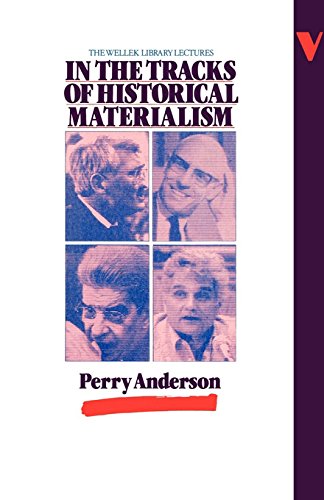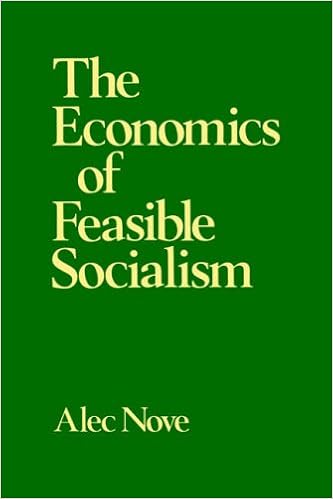 |
| Amazon link |
In this work (based on a lecture series in 1983) Anderson addresses (amongst other things) the legacy of Critical Theory and structuralism: the work of Levi-Strauss, Lacan, Foucault and Derrida. You will not encounter a clearer overview or critique of their school.
The author's preferred style is olympian abstraction but he is also a bit of a magpie, selecting authors and works here and there which have struck his interest. He is extremely open-minded and non-dogmatic. But he doesn't want to be a reformist or a renegade - so many of those in the history of Marxian thinking! - so when he encounters a dogma he has internalised, and which is thereby uncritiqueable, he's forced to a fanciful or fantastic conclusion. I won't discuss it further here, but his views on why the feminist agenda is unachievable under capitalism (but will be delivered by socialism) defy belief.
---
Let's look at his postscript for "In the Tracks of Historical Materialism" via selected extracts. He starts with the lack of any serious examination within the Marxist tradition of what socialism would actually be like. As he correctly observes:
"Yet it is quite clear that without serious exploration and mapping of it, any political advance beyond a parliamentary capitalism will continue to be blocked. No working-class or popular bloc in a Western society will ever make a leap in the dark, at this point in history, let alone into the grey on grey of an Eastern society of the type that exists today. A socialism that remains incognito will never be embraced by it.---
To bring the two closer together, there are four great areas where practical research and proposal are above all now needed.
(i) The first of these is this the political structure of a socialist democracy. What would be the precise forms of mandate, periodicity, franchise and constituency in a `neo-soviet' system articulating workplace and residential principles within a producers' democracy covering polity and economy alike?
(ii) The second central area for debate is obviously the pattern of an advanced socialist economy. Assuming a full producers' democracy and popular determination of alternative plans, all the most difficult and intricate problems remain.
- How far would a professional administrative apparatus subsist?
- What division of powers would be codified?
- How would jurisdiction be allocated between national and local instances of authority?
- Would there exist a new 'technology of delegation'?
- What would be the optimal ways of disaggregating control over the means of communication?
(iii) A third area where careful reflection is long overdue is what might be called the socio-cultural pattern of a 'libertarian levelling' - that is, means for abolishing class and gender inequalities beyond the reappropriation of the means of production by the direct producers.
- What would be the range of forms of social ownership?
- How large, or small, a role should the market play?
- Could planning ever pre-adjust to new needs, with their inherent dynamism?
- What devices would exist to resolve conflicts between central and regional interests?
- What would be the appropriate combination of price mechanisms?
- How should consumer rights be articulated with those of producers, in major services?
- Should the volume of product choices be increased, or diminished?
- Which patterns of technology, and what distribution of labour-times, would be desirable?
- How should different jobs be remunerated?
What kinds of detailed transformation of the educational system, and mutations of the division of labour, would most effectively tend to overcome any inherited or imposed ladder of life-chances - while at the same time multiplying rather than restricting individual differentiation and development of talent?
(iv) The final and most formidable area of all concerns the international relations between - inevitably - unevenly developed socialist countries themselves. Ultimately, this involves the problem of the relationship between the producing classes in the rich nations and those of the poor nations, as well as the question of the relationship between the world peasantry and the world working-class within the poorer countries themselves.
Merely to enumerate such questions is to register how little most of them have been directly confronted within the Marxist tradition in the West."
- What would be any protectable pattern of equitable flows of trade and investment between North and South, were both liberated from the sway of capital?
- How could revenues and resources be progressively best shared?
- What kinds of technological exchange and diffusion would most depolarize the economic geography left by capitalism?
- Is 'evened development' historically imaginable - if so, what would it mean?
Anderson then considers "The Economics of Feasible Socialism" by Alec Nove.
 |
| Amazon link |
I have not read this book but reviewers point to its rather pedestrian vision of municipal quasi-social-democracy, a mixed economy with nationalisation of the commanding heights .. and strict egalitarian salaries .. and parliament.
Anderson is extremely polite, and in his own dismissal through faint praise simply notes that Nove present no roadmap for transition to such a state, which in any event is unlikely to inspire proletarians to die in a ditch. He continues:
"If capital could visit such destruction on even so poor and small an outlying province of its empire as Vietnam, to prevent its loss, is it likely that it would suffer its extinction meekly in its own homelands?The step Anderson is not prepared to take is this: accept that capitalism is not weak, that its superficial contradictions are not life-threatening and that Bolshevik-style revolutions will never happen in advanced capitalist states.
The lessons of the past sixty-five years or so are in this respect without ambiguity or exception: there is no case, from Russia to China, from Vietnam to Cuba, from Chile to Nicaragua, where the existence of capitalism has been challenged, and the furies of intervention, blockade and civil strife have not descended in response.
Any viable transition to socialism in the West must seek to curtail that pattern: but to shrink from or to ignore it is to depart from the world of the possible altogether. In the same way, to construct an economic model of socialism in one advanced country is a legitimate exercise: but to extract it from any computable relationship with a surrounding, and necessarily opposing, capitalist environment - as this work does - is to locate it in thin air. "
Capitalist states have seen great dislocations and have tolerated left-wing governments (which absorbed and defused popular discontent). Their subsequent policies tended to wreck the economy which then ushered in a period of political counter-revolution (the Allende-Pinochet transition in Chile is an extreme case in point). Finally capitalism (with its vast reserves) stabilised and resumed (Chile today is quite successful).
The one thing capitalism can't handle is abundance, which undermines market relations. That's the area Anderson should be looking at but it's beyond his intellectual paradigm.
---
Related: "Perry Anderson on Western Marxism and Hegemony".
No comments:
Post a Comment
Comments are moderated. Keep it polite and no gratuitous links to your business website - we're not a billboard here.